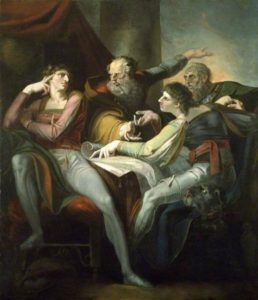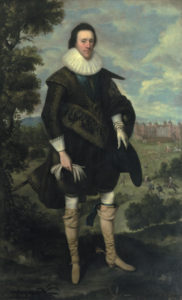‘No No my Lord’

Henry Percy, 9th Earl of Northumberland, wearing Chancellor’s Robes and the Garter Ribbon; by Anthony van Dyck (1599-1641); Petworth House.
Anyone frustrated by current arguments in the news might benefit from reading the following spirited letter from the ninth Earl of Northumberland to William Cecil, second Earl of Salisbury. The subject is negotiations concerning the marriage of Lady Anne Cecil to Algernon Percy, future tenth Earl of Northumberland, and money that the ninth Earl Percy was asked to contribute for the couple’s future daughters. Earl Percy indignantly turns down the request and, to support his answer, refers to Hotspur’s lines in Henry IV Part. 1, Act III, Scene I, lines 70 ff.
Dr. Maria Kirk drew my attention to Prof. Helen E. Sandison’s publication of the document in ‘The Ninth Earl of Northumberland Quotes his Ancestor Hotspur’, Review of English Studies, 12 (1936), 71-75. The transcription is by J. V. Lyle, Librarian at Hatfield House at the time. Vicki Perry, present Head of Archives and Historic Collections at Hatfield House, tells me that the letter’s shelf designation is now Cecil Papers 126/168.
Sandison effectively provides a context for the letter. She argues convincingly that the date of the letter is probably January 1628. (73-4) She also describes bad relations between Earl Percy and Robert Cecil, first Earl of Salisbury, stemming from accusations against Percy in connection with the Gunpowder Plot. (73) Maybe Percy’s anger against Robert Cecil had some role in his unhappiness with William, Robert’s son.

Title page of the First Quarto edition of Shakespeare’s Henry IV, Part 1, 1599; Simon Stafford (printer), Andrew Wise (publisher); Folger Shakespeare Library Digital Image Collection http://luna.folger.edu/luna/servlet/s/w5j6k2
One might add that Percy’s reference to Shakespeare is perhaps more than ornamental. Maybe Earl Percy intends to remind his reader that the Percy earldom is centuries older than the Cecil title. Moreover, the Percies have been the focus of highly-regarded entertainment, something that the Cecils cannot claim. Percy implies that the second Earl of Salisbury should have shown greater deference to the representative of a more established, more celebrated noble family.
The letter also relates to Shakespeare’s representation of the nobility, a sensitive issue discussed very thoroughly by Catherine Grace Canino in Shakespeare and the Nobility: The Negotiation of Lineage (Cambridge: Cambridge University Press, 2007). Clearly, the Earl was keeping track of his family as portrayed in Shakespeare’s drama. A favorable image of Hotspur was in the playwright’s interest.
Finally, the letter is an example of the ninth Earl’s vigorous, literate, prose style. Here, in an ordinary business letter, Percy quotes Shakespeare and adds effective figurative language of his own: ‘I love not my sonne soe evell as to thrust sutche a thorne in his heele’ (74). Maybe Hatfield House and other private collections include additional letters from Earl Percy that could make enjoyable, instructive reading.
The Earl writes to Cecil:
‘”My LORD,
I stayed your servant a day longe[r] than he was willing, I was full of paine and am soe still, therfore cannot make any long discourse whiche I hope you will excuse: but to the matter. Thus. I cannot chuse but know what £12000 is in any of our purses of our qualites and how littell it is agayne in theas tymes when we comme to the spending it.
I have considered your Lo[rd’s] demands, I find two of them in myne opinion unreasonable, and sutche as I shall never grant to soe long as I breathe; the one nether in part nor in whole which is the portion for dawghters that is not yett in being,* a new devise, rarely used, and in myne opinion very dangerous for them and Fathers also; for it will seclude all obedience when they stand not at the fathers will by obeing him or his commands: it layes them open to all abusive needy persons, that if they can but gaine a poore yong girles good opinion, she is lost and the father must pay for it whether he will or noe: soe as I conclude that I will never be an instrument to breede that disobedience; I love not my sonne soe evell as to thrust sutche a thorne in his heele : for believe me my Lo[rd] I never saw mariages made with too great tyes ever prosper, and obedience to it in what sort eoe ever, ether religious obedience or morall obedience, and it was ever bounded by reward or punnishement, else came it to nothing nor did ever prosper: therfore lett them trust to the care of ther fathers as we trusted to ours: I meane not by theas too great tyes, matters of jointers, fitt for the place, fitt for dwelling, not too farre disperste for a womans manage, for soe shall the heire be the looser in the end; but I mean sutche tyes as shall make the wyfe insult upon her husband, or the sonnes or dawghters neclect and be careless of ther fathers; therefore my Lo[rd] lett us runne in a straight line, without turnings and windings, as Henry Hottspurre would have it, when Mortimer and he devided England in a mappe.

Dispute between Hotspur, Glendower, Mortimer & Worcester, from Shakespeare’s Henry IV, Pt. 1, Act III; painting by Henry Fuseli, 1784; (public domain)
Now my Lo[rd], concerning your second demande, that I should assure all the land I have £2000 excepted upon my sonne this demaund I hold also unreasonable and will never doe it soe long as I live: but soe mutche as is answerable to a portion of any nature as shall be offered, that I hold reasonable: for my Lo[rd] thoughe the beauty of your dawghter fetered my sonne, good my Lo[rd] doe not thinke to shackell me with £12000, whereas if mony were the marke I only shott at, I could easily carve myselfe of that somme out of £200000 that I have at myne own disposing. Your Lo[rd] is but a stranger to me and perhapps knowes me not to be one of theas harche natures as they call me; and doe they thinke that I will so easely put out of my hands the power god hathe putt into, and make myselfe a slave to my Sonne? No no my Lord, yow will finde that I canne as easely leawe a sonne as a sone can leave a father; and that I know very well where the strength of obedience lieth. But perhaps somme that seeketh to heape all uppon him and thinkes the sweetnes of his nature lies fitter for the moing than myne doeth, are apt to perswade yow to theas demands; when they consider not, that I may marry againe, then must ther be portions for other children, jointers for a wyfe, a sonne in being must be cared for, brothers I have many if I list to enlarge ther meanes, grandchildren I am not without, and my Lo[rd] the sinewes of my arme are not soe stiffe but that I may venture to give a bloe for the service of my cuntry, and by chaunce becomme a prisoner, shall I be beholding to my sonne for my ransomme; or if I shall be in debt shall I stand to his award: Thus your Lo[rd] sees what I am resolved in theas two points : if theas yow pleas to lay aside yow may treat of the rest, if not lay them by, it is but labor to treate farther; and soe not giving your Lo[rd] farther trooble, I rest your Lo: to dispose of
Petworth this 29 January.”‘
the recipient of the Earl’s letter:

William Cecil, 2nd Earl of Salisbury (1591-1668); painting by George Geldorp, 1626; https://commons.wikimedia.org/wiki/File:2ndEarlOfSalisbury.jpg
*(‘This condition might almost be suspected of prognostic force, for Lady Anne, who died in 1637 without having borne the tenth Earl a son, had by 1636 borne him five daughters.’)
This month’s Flower is very kindly provided by Bob Alexander (Point Park), editor of the forthcoming REED: Percy Papers. The transcription of the Earl’s letter is taken from Prof. Helen E. Sandison’s article on ‘The Ninth Earl of Northumberland Quotes his Ancestor Hotspur’, in Review of English Studies, 12 (1936), 71-75. The transcription is by J. V. Lyle, Librarian at Hatfield House at the time.
